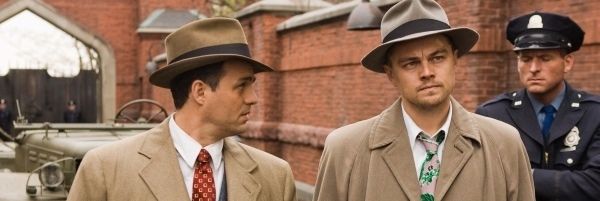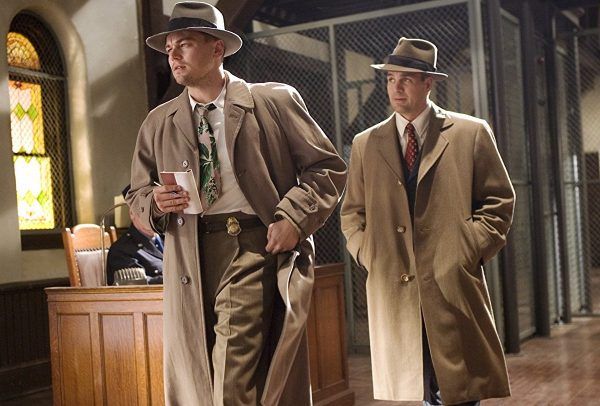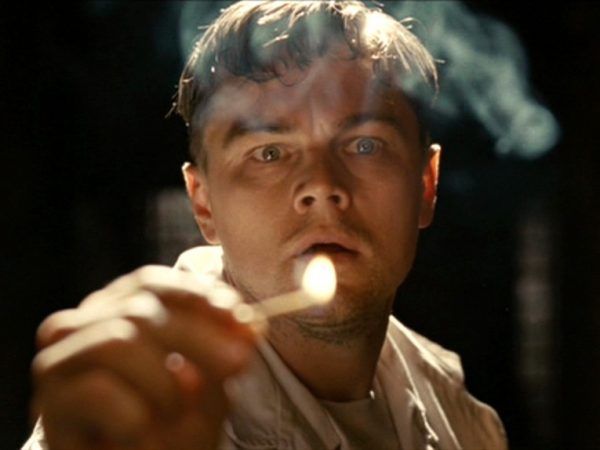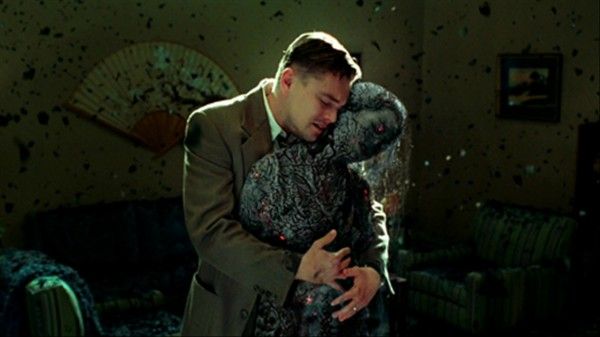Exactly 10 years ago, duly-appointed U.S. Marshal Teddy Daniels was in search of a woman. Teddy, a man wearing the burdens of his past in his furrowed brow and hunched shoulders, needed to locate an escape patient named Rachel Solando like his life depended on it. And, to a certain degree, his life was depending on something — but it wasn't finding Rachel. Over the course of all 138 minutes of Shutter Island, we saw just how tenuous the narratives Teddy had constructed to maintain control over his version of reality were.
Released on February 16, 2010, Martin Scorsese's rendering of Dennis Lehane's novel of the same name, as penned by writer Laeta Kalogridis (Alita: Battle Angel), is arguably the director's biggest stab at creating a Hitchcockian thriller. Swimming up to its ears in moroseness, with pivotal scenes set during a dark and stormy night and populated by many a shifty character, Shutter Island envelopes you in its world easily and quickly. Set in 1954, we follow Teddy (Leonardo DiCaprio) and his new partner, Seattle import Chuck Aule (Mark Ruffalo), as they make their way to Shutter Island, located in the Boston harbor. Shutter Island is home to Ashcliffe Hospital for the criminally insane. It seems inmate and child murderess Rachel Solando (Emily Mortimer and later, Patricia Clarkson) and only Teddy and Chuck are equipped to suss out how Rachel escaped her guarded cell. But the longer Teddy is on Shutter Island, the clearer it becomes he is working overtime to suppress trauma from time served in Germany during World War II and from the tragic end to his marriage.
Teddy is a man skating on very thin ice from the get-go. We should be clued in when we meet him struggling to not puke from seasickness while on the ferry crossing over to Shutter Island. We should be tipped off when Teddy and Chuck meet Dr. Cawley (Ben Kingsley) and Dr. Naehring (Max Von Sydow) in a drawing room for drinks and a bit of Gustav Mahler triggers memories of Teddy killing Nazi officers during the liberation at Dachau. We should be further clued in when he sees his dead wife, Dolores (Michelle Williams), in his dreams, giving him ominous clues about his investigation. We should be on the edge of seat wondering when he's going to crack as waking nightmares involving his fictional versions of Rachel Solando and Andrew Laeddis (Elias Koteas) blend with what he saw at Dachau and his murdered children.
Everything is on the verge of falling apart if you know where to look. The smallest trigger, whether its memory-provoking Mahler or the sudden realization that the glass someone is holding might not be there, threatens to tear down the story being constructed to get Teddy to admit his crimes. As you go deeper down the rabbit hole (and boy howdy, it's deep) and the truth about Teddy's past becomes clearer, you realize just how far he has gone to protect himself from the truth. He was shaped by events monstrous and unforgivable which threaten to weigh him down at every turn. Teddy is a man who believes he is good, is in control, and understands how the world works. In fact, as Shutter Island reveals in its final act, Teddy is the one being controlled and whatever firewalls he has put in place in order to make sense of what he has done or has been done to him are not as impenetrable as he once thought.
So, we have to wonder: What is Shutter Island trying to caution us against here? Excluding the conversation around mental illness, which is central to this story but potentially not applicable to some of you reading this (but a worthy talk for another time), it seems we're being warned against the dangerous comforts of constructed narratives. Specific ideas and truths we alone believe to be true can, ultimately, be false. As individuals, we construct our own version of reality every day and fit events into it so they specifically gel with our creation. Our specific kind of perception is protection, allowing us to carry on in this otherwise cold, distant so that we can maintain some control.
It's not uncommon to tailoring a Twitter feed so you only see certain folks' thoughts or associate with friends who are really birds of a feather or watch the TV shows and movies you want to watch, you are actively shaping a reality which will fit your worldview. We invest in various ways to soothe ourselves or push back invasive thoughts and words through methods which frequently fall under the banner of "self-care". We are surrounded by socio-economic and political systems which benefit some over others, subjugate most of us, and demand allegiance regardless. It feels so easy to become overwhelmed; why wouldn't we seek some form of control over the chaos.
To a certain extent, we are all Teddy. After a decade of repeat viewings of Shutter Island, including a recent re-watch for this piece, it's hard not to empathize with him. Granted, the reality Teddy is trying so hard to repress with false narratives about a missing inmate and secret government experiments are much more grisly than what we may be working against these days. But connecting with someone so deeply committed to reshaping their memories and personal history and using it to influence their own future is strong and resonant and eternally applicable as we continue forward in time. At the same time, in recognizing how understandable Teddy's behavior is and how easily replicated it is in real life, Shutter Island cautions us time and time again to not take it too far. Sure, you can smooth over the rough parts of your past you're not ready to acknowledge or ignore signs about the truth of any given matter staring you in the face — but do you really want to do that? Comfort is temporary in a house built of half-truths and glossed-over events. The story you create for yourself out of the self-care and fine-tuning of information cannot hold for long.
Teddy ultimately succumbs to his own version of reality. Cawley and Sheehan's roleplaying experiment — an attempt to construct an even safer narrative for Teddy to help him accept reality — is an abject failure. Again, Teddy's past is likely so much heavier than what many of us deal with, but Shutter Island's ultimate conclusion that it will be instinctual to return to the comfort of half-truths and carefully-woven stories meant to shield oneself from a potentially horrifying reality is a damning one. There may never be a break in this cycle and we may never find a different kind of coping mechanism. Perhaps we will — I sure hope we will — but Shutter Island suggests it's a hell of a hard thing to do.




